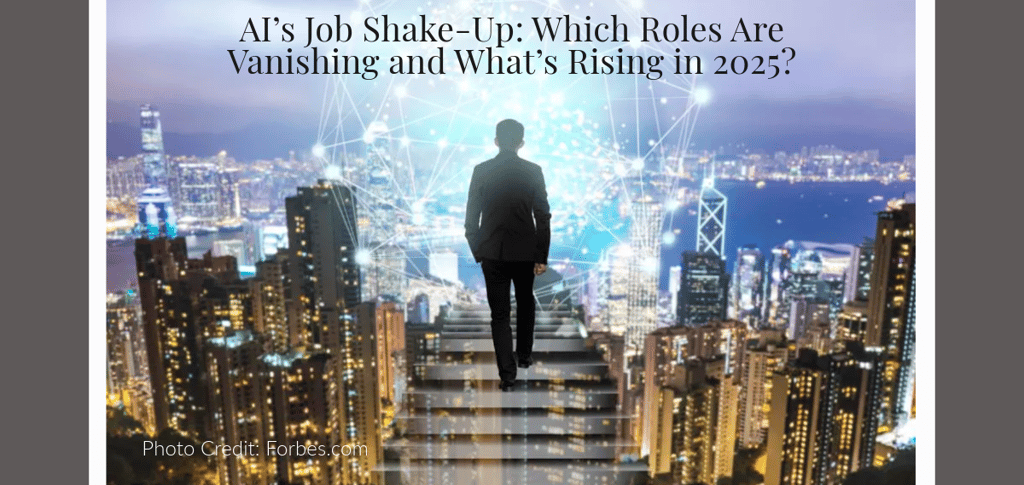AI’s Job Shake-Up: Which Roles Are Vanishing and What’s Rising in 2025?
4/16/2025


AI’s Job Shake-Up: Which Roles Are Vanishing and What’s Rising in 2025?
Artificial intelligence (AI) is rewriting the rules of work in 2025, sparking a revolution that’s both thrilling and unsettling. From automating mundane tasks to creating entirely new professions, AI is reshaping industries at lightning speed. While some jobs face the chopping block, others—like AI ethicists—are emerging as vital to navigating this brave new world. Drawing on McKinsey’s 2024 insights, Gartner’s projections, and buzzing discussions on X, this post dives into which roles are at risk, the exciting opportunities AI is unlocking, and what it means for workers and the global economy. Buckle up: the future of work is here, and it’s a game-changer.
Jobs at Risk: Automation’s Hit List
AI’s knack for crunching data, recognizing patterns, and executing tasks is transforming workplaces, but not all jobs are safe. McKinsey estimates 30% of current roles could be automated by 2030, with certain sectors facing the brunt:
Repetitive Office Work: Data entry clerks, administrative assistants, and bookkeepers are in the crosshairs. AI-powered robotic process automation (RPA) handles these tasks 10 times faster, per Deloitte. Posts on X highlight firms slashing admin staff as AI streamlines workflows.
Customer Service: Chatbots and virtual assistants, like those built on advanced language models, manage 70% of queries in retail and banking, per Gartner. Call center agents and support reps are seeing demand plummet.
Accounting and Finance: AI tools like QuickBooks AI automate tax prep, auditing, and reporting, threatening junior accountants. The World Economic Forum (WEF) notes 40% of accounting tasks are now AI-driven.
Manual and Predictable Labor:
Manufacturing: AI robots assemble products and manage inventory, with Tesla’s Gigafactory cutting production times by 30%. Unskilled factory workers face 20% job losses by 2030, per McKinsey.
Transportation: Autonomous trucks, taxis, and drones threaten drivers. Waymo’s self-driving taxis are expanding, and Amazon’s drone trials are scaling. The International Transport Forum projects 2 million U.S. driving jobs could vanish by 2035.
Entry-Level Analytical Roles: AI automates data crunching, squeezing junior data analysts and content creators. Tools like Tableau’s AI and generative platforms produce reports and marketing copy, though strategic roles remain human-driven.
High-risk jobs involve repetitive tasks or structured data. Low-skill roles are hit hardest, but even white-collar professions feel the heat.
Emerging Opportunities: The AI Job Boom
AI isn’t just a job-killer—it’s a job-creator. The WEF predicts 97 million new jobs by 2030, outpacing losses. Here’s where the action is:
AI Development and Management:
Machine Learning Engineers: Building and training AI models is a goldmine, with salaries averaging $150,000 in the U.S., per Glassdoor. Tech giants like xAI are hiring aggressively.
Prompt Engineers: Crafting precise AI inputs is a niche skill, fetching $100,000–$200,000 annually, per X posts.
Data Annotators: Humans fine-tuning AI by labeling data are in demand, especially in remote roles across tech hubs and emerging markets.
AI Ethics and Governance:
AI Ethicists: As AI shapes society, ethicists ensure fairness and transparency, tackling issues like biased hiring algorithms. McKinsey notes 60% of Fortune 500 firms now employ ethicists, with salaries starting at $120,000.
Regulatory Specialists: Laws like the EU AI Act demand experts to align AI with regulations. LinkedIn reports a 25% hiring spike since 2024.
Trust and Safety Officers: Monitoring AI for harmful outputs, especially in social media, is critical, with Meta and TikTok expanding teams.
Human-AI Collaboration:
AI-Augmented Creatives: Writers and designers using tools like Runway or DALL-E cut production time by 50%, thriving in hybrid roles.
Healthcare AI Experts: Doctors trained in AI diagnostics, like cancer detection (20% more accurate, per Stanford), are in high demand.
Edtech Innovators: AI-driven learning needs educators to design personalized curricula, with edtech hiring up 15%, per EdSurge.
Green AI Roles: Experts optimizing AI’s energy use or applying AI to climate solutions (e.g., smart grids) are rising, with Google and IBM leading hires.
These roles demand tech fluency, creativity, or ethical judgment—skills AI can’t replicate.
The Bigger Picture: A Workforce in Transition
AI’s impact is profound:
Economic Shifts: Automation could save $15 trillion annually by 2030, per PwC, but displaced workers need reskilling. Governments and firms are investing $1 billion in upskilling, per OECD.
Inequality Risks: Low-skill workers face job losses, while high-skill roles thrive, widening income gaps. The IMF warns of social unrest if reskilling lags.
Global Dynamics: Emerging markets like India are becoming AI outsourcing hubs, while developed nations lead in high-skill roles.
Upskilling is critical. Coding bootcamps, AI ethics courses, and certifications are booming, with Coursera reporting 30% enrollment growth in AI-related programs.
A Critical Perspective
AI’s job transformation is a double-edged sword. Automation boosts efficiency but risks mass displacement—McKinsey’s 30% figure may even be conservative given AI’s rapid advances. Ethical concerns, like biased algorithms or surveillance overreach, underscore the need for roles like AI ethicists. Yet, the job boom favors the educated and adaptable, leaving low-skill workers vulnerable. Historical tech shifts, like the Industrial Revolution, show adaptation is possible, but today’s pace is unprecedented. Reskilling and policy support are non-negotiable to avoid a divided workforce.
The Future of Work Is Now
AI is both disrupting and creating the job market, demanding agility from workers and leaders alike. While repetitive roles face obsolescence, opportunities in AI development, ethics, and human-AI collaboration are soaring. The challenge is clear: adapt, upskill, or risk being left behind. As AI reshapes the global economy, 2025 is a pivotal year to seize the opportunities—or brace for the fallout.
Thought-Provoking Questions:
Can reskilling programs keep pace with AI’s rapid automation of low-skill jobs?
Will roles like AI ethicists become mainstream, or remain niche as AI adoption surges?
Could AI-driven inequality spark social unrest if governments and firms don’t act?
hello@boncopia.com
+13286036419
© 2025. All rights reserved.